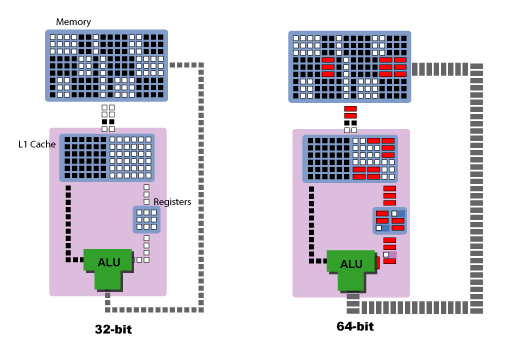Which of the Following is the Biggest Advantage of 64-bit Processors over 32-bit Processors?
In the realm of computer technology, processors play a crucial role in determining the overall performance and capabilities of a computing device. The transition from 32-bit processors to 64-bit processors has brought about significant advancements in computing power. This article aims to explore and highlight the biggest advantage of 64-bit processors over their 32-bit counterparts.
I. Understanding 32-bit and 64-bit Processors:
Before delving into the advantages of 64-bit processors, it is important to comprehend the fundamental differences between 32-bit and 64-bit architectures. A processor's "bitness" refers to the length of data that it can process in a single instruction.

32-bit and 64-bit Processors
A 32-bit processor can handle data in 32-bit chunks, while a 64-bit processor can process data in 64-bit chunks. This distinction has profound implications for computing performance and capabilities.
II. Advantage of 64-bit Processors:
The biggest advantage of 64-bit processors over 32-bit processors lies in their increased memory capacity. A 32-bit processor can address up to 4GB of RAM, limiting the amount of memory that can be utilized effectively.
On the other hand, a 64-bit processor can theoretically address a staggering 18.4 million TB (terabytes) of RAM. This enormous memory capacity enables 64-bit processors to handle large datasets, complex calculations, and memory-intensive applications with remarkable efficiency.
III. Enhanced Performance and Speed:
The expanded memory capacity of 64-bit processors leads to improved performance and speed in various computing tasks. With more memory available, applications can store and access larger amounts of data, reducing the need for constant swapping between RAM and the hard drive.
This results in faster data processing, shorter loading times, and smoother multitasking, ultimately enhancing the overall user experience.
IV. Support for Larger File Sizes:
Another significant advantage of 64-bit processors is their ability to handle larger file sizes. In the realm of multimedia, such as video editing, graphic design, and 3D modeling, file sizes can be substantial. A 32-bit processor may encounter limitations when processing or manipulating these large files.
In contrast, 64-bit processors can effortlessly handle massive files, allowing for seamless editing, rendering, and manipulation of high-resolution content.
V. Improved Security:
64-bit processors offer enhanced security features compared to their 32-bit counterparts. One notable aspect is the inclusion of hardware-level data execution prevention (DEP) and address space layout randomization (ASLR).

Improved Security
DEP prevents malicious code from executing in certain memory areas, adding an extra layer of protection against various types of attacks.
ASLR, on the other hand, randomizes the memory addresses used by system components, making it harder for hackers to exploit vulnerabilities. These security enhancements provide a more robust defense against malware and unauthorized access.
VI. Future-Proofing Technology:
Investing in 64-bit processors ensures compatibility with the rapidly evolving landscape of software and operating systems. As technology progresses, software developers increasingly optimize their applications for 64-bit architectures, taking advantage of the expanded memory and processing capabilities.
By adopting 64-bit processors, users can future-proof their systems, ensuring compatibility with the latest software updates and advancements in computing technology.
VII. Conclusion:
In conclusion, the biggest advantage of 64-bit processors over 32-bit processors is their expanded memory capacity. This advantage leads to improved performance, faster data processing, support for larger file sizes, enhanced security features, and compatibility with future software advancements.
As the demand for computing power continues to grow, 64-bit processors have become the standard in modern computing, empowering users with increased capabilities and efficiency.